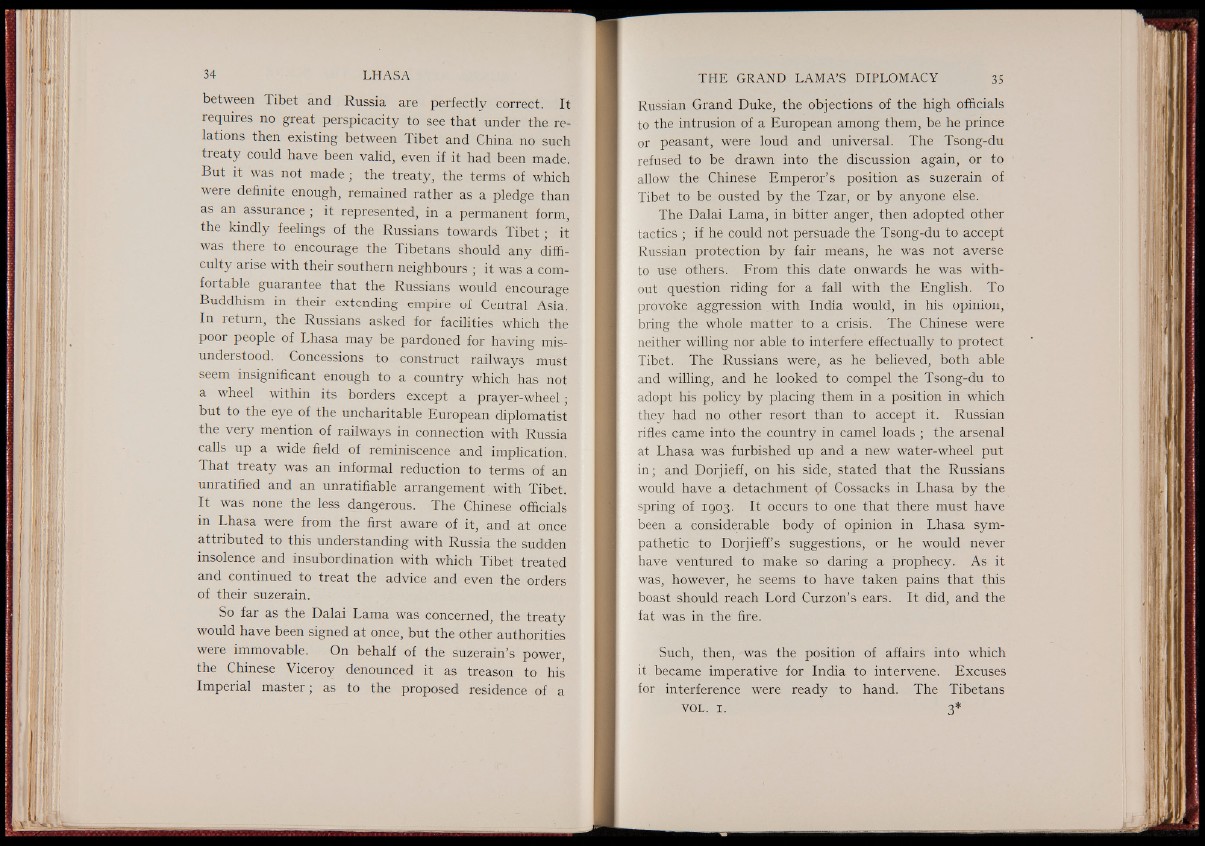
between Tibet and Russia are perfectly correct. It
requires no great perspicacity to see that under the. relations
then existing between Tibet and China no such
treaty could have been valid, even if it had been made.
But it was not made § the treaty, the terms of which
were definite enough, remained rather as a pledge than
as an assurance; it represented, in a permanent form,
the kindly feelings of the Russians towards T ib e t; it
was there to encourage the Tibetans should any diffi-
culty arise with their southern neighbours • it was a comfortable
guarantee that the Russians would encourage
Buddhism in their extending empire of Central Asia.
In return, the Russians asked for facilities which the
poor people of Lhasa may be pardoned for having misunderstood.
Concessions to construct railways must
seem insignificant enough to a country which has not
a wheel within its borders except a prayer-wheel ;
but to the eye of the uncharitable European diplomatist
the very mention of railways in connection with Russia
calls up a wide field of reminiscence and implication.
That treaty was an informal reduction to terms of an
unratified and an unratifiable arrangement with Tibet.
It was none the less dangerous. The Chinese officials
in Lhasa were from the first aware of it, and at once
attributed to this understanding with Russia the sudden
insolence and insubordination with which Tibet treated
and continued to treat the advice and even the orders
of their suzerain.
So far as the Dalai Lama was concerned, the treaty
would have been signed at once, but the other authorities
were immovable. On behalf of the suzerain’s power,
the Chinese Viceroy denounced it as treason to his
Imperial master; as to the proposed residence of a
Russian Grand Duke, the objections of the high officials
to the intrusion of a European among them, be he prince
or peasant, were loud and universal. The Tsong-du
refused to be drawn into the discussion again, or to
allow the Chinese Emperor’s position as suzerain of
Tibet to be ousted by the Tzar, or by anyone else.
The Dalai Lama, in bitter anger, then adopted other
tactics ; if he could not persuade the Tsong-du to accept
Russian protection by fair means, he was not averse
to use others. From this date onwards he was without
question riding for a fall with the English. To
provoke aggression with India would, in his opinion,
bring the whole matter to a crisis. The Chinese were
neither willing nor able to interfere effectually to protect
Tibet. The Russians were, as he believed, both able
and willing, and he looked to compel the Tsong-du to
adopt his policy by placing them in a position in which
they had no other resort than to accept it. Russian
rifles came into the country in camel loads ; the arsenal
at Lhasa was furbished up and a new water-wheel put
in; and Dorjieff, on his side, stated that the Russians
would have a detachment of Cossacks in Lhasa by the
spring of 1903. It occurs to one that there must have
been a considerable body of opinion in Lhasa sympathetic
to Dorjieff’s suggestions, or he would never
have ventured to make so daring a prophecy. As it
was, however, he seems to have taken pains that this
boast should reach Lord Curzon’s ears. It did, and the
fat was in the fire.
Such, then, was the position of affairs into which
it became imperative for India to intervene. Excuses
for interference were ready to hand. The Tibetans
v o l . 1. 3*